Understanding Eco-Tourism
Visitors curious about exploring the world sustainably and ethically need to understand eco-tourism. We can ensure that our travel-related activities have a positive and long-lasting impact by adhering to the values of conservation, community involvement, and awareness. Eco-tourism, also known as Sustainable Tourism, is a kind of travel that places an important priority on community involvement, cultural preservation, and environmental protection. It provides a means for wanderers to see various parts of the globe while having minimal unfavorable effects on the environment and helping the local population.

Tips for Eco-friendly Travel in Nepal as a Tourist
When exploring this amazing country, it is crucial to adopt eco-friendly practices as reliable global citizens. Therefore, why not choose to travel sustainably? By sticking to sustainable travel guidance, you may ease your influence on the environment, support local communities, and help to preserve Nepal's cultural and natural assets. Here are some excellent and paramount tips for Eco-friendly Travel in Nepal.
Select Eco-Friendly Travel Agencies
Selecting travel companies or tour operators who place a priority on environmental responsibility is one of the vital steps when commencing Eco-friendly travel in Nepal. These companies usually hire local guides, participate in community development campaigns, and offer eco-friendly lodging. Look for tour operators who clearly commit to sustainability and adopt environmentally friendly strategies. Confirm that the travel company adheres to appropriate wildlife tourism practices if your travel itinerary calls for wildlife encounters. Furthermore, if trekking is part of your program, your agency should prioritize trail maintenance, basic cleanliness, and rubbish management along trekking trails, and promote initiatives for sustainable trekking.
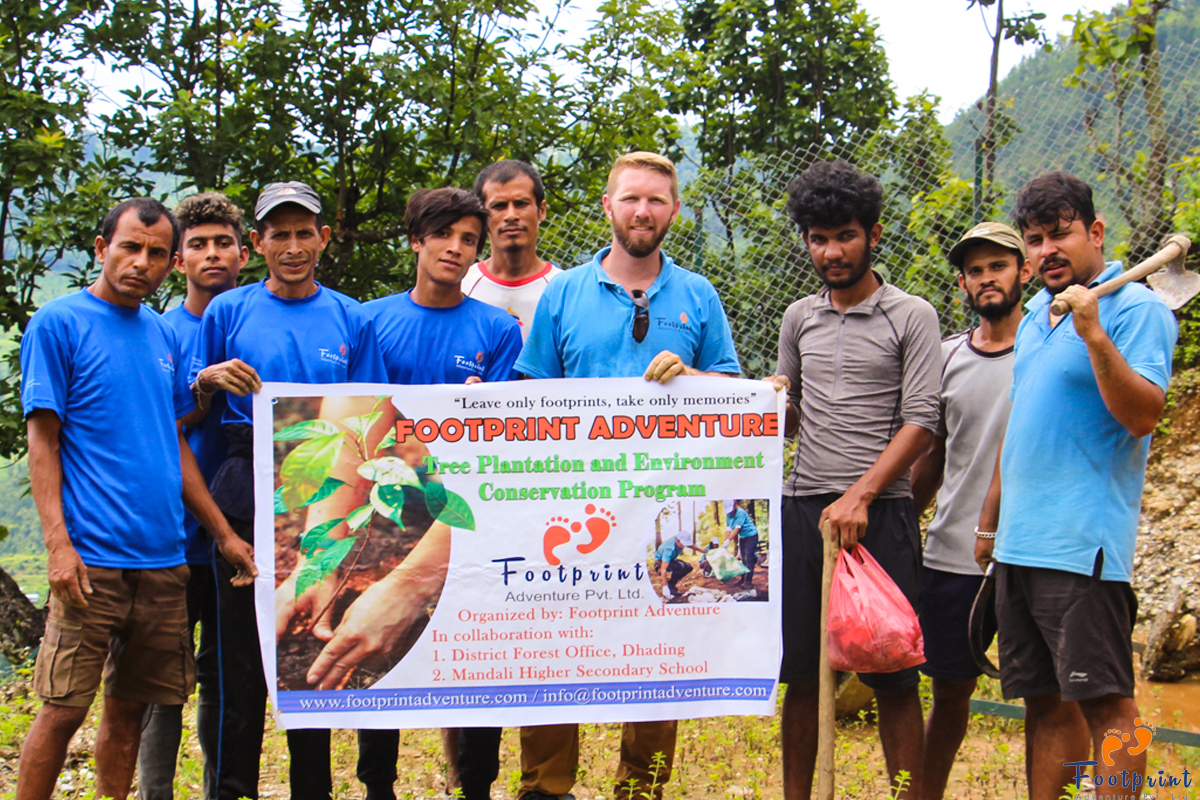
Being a CO2-neutral certified agency , Footprint Adventure offers several environmentally responsible treks in Nepal's high altitudes. Join us in our sustainable endeavor at any time.
Reduce Plastic Usage
There are many methods for you as a traveler to lessen your plastic footprint, as this is an important step in promoting Eco-friendly travel in Nepal. Plastic pollution is an issue for everyone, including Nepal. Carry a reusable water bottle and periodically refill it from reliable water sources to bear responsibly as a traveler. Bring a reusable shopping bag when visiting local markets or buying gifts in Nepal to avoid using the plastic bags provided by vendors. Look for hotels or other accommodations that utilize recyclable packaging, give you filtered water, or take additional measures to minimize plastic waste.
By setting these demeanors into practice, you help reduce plastic pollution, act as an inspiration to others, and safeguard Nepal's pristine nature.
Respect Local Traditions and Cultures
Respecting local customs and norms demonstrates a fondness for Nepal's rich past and fosters healthy interactions between travelers and the native population. It is an essential component of Eco-friendly travel in Nepal. Dress suitably and modestly when visiting religious sites. Also, ask permission before photographing religious objects, celebrations, or local faces. Engage in expressive interactions with local neighborhoods, hear their experiences, celebrate their festivals, and sustain local artists by purchasing their handmade products. Accept the flavors and ingredients that are unique to the region and support preserving culinary traditions. Also, try learning some primary local terms and words to enhance your relationships and develop a more meaningful and inclusive understanding.

The integrity and uniqueness of the destinations you visit are preserved because of this cultural sharpness, which also supports Sustainable tourism.
Follow Responsible Trekking Practices
Sustainable trekking guarantees that coming generations will be able to take pleasure in this glorious nation's sensational scenery and cultural variousness. You can directly support the local economy and promote sustainable livelihoods by hiring local assistance on the trek. Stick to the accepted trekking trails to lower the consequence on liable ecosystems. Take all your rubbish with you and adequately dispose of it at approved waste disposal sites. When trekking in Nepal, always pick eco-lodges and local tea houses that facilitate sustainable practices. Additionally, buying local products on travel helps the local economy grow and makes sure that the benefits of tourism reach the communities that rely on trekking for their standard of living. Additionally, lowering the use of single-use plastics and respecting wildlife and the natural world is crucial for eco-friendly tourism in Nepal since they help protect vulnerable mountain ecosystems and local populations
Supporting Sustainable Agriculture
Farming is a significant source of income in almost all of Nepal's rural regions. A more stable and long-lasting food system in Nepal can be boosted by empowering local farmers and embracing sustainable agriculture practices. When eating out or buying food items, travelers should give local suppliers preference. Consume veggies, fruits, and other naturally produced foods while you are there to embrace seasonal eating. This lessens the demand for vegetables grown out of the season, which frequently necessitates high-energy inputs for cultivation or artificial preservation techniques. Don't forget to visit nearby farms as well, since this will give you the chance to witness sustainable farming methods in action, interact with the local farming community, and learn about traditional methods of cultivation. Harvesting and planting provide authentic experiences, but they also help local farmers by generating additional revenue and fostering cross-cultural interaction. Help sustain local farmers by buying their agricultural products directly from them or from markets near you, such as fresh herbs, fruits, or honey, to assist in the growth of a sustainable cycle of prosperity.
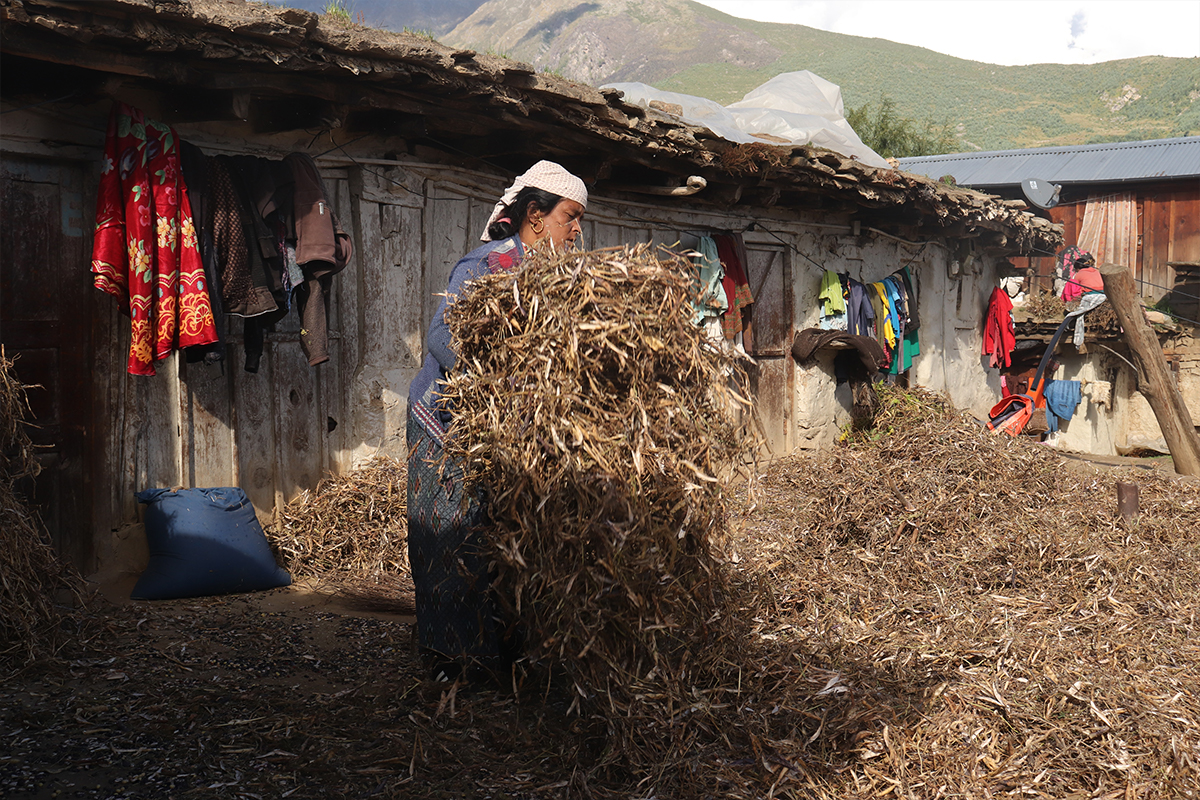
Engage in Volunteer Conservation Work
Chances for volunteer work not only directly support conservation endeavors but also provide a deeper understanding of the ecosystems in Nepal. Give your time and expertise to various conservation projects in Nepal. Become involved with local academic institutions or groups that provide environmental programs. Educating local students about conservation and sustainable practices is something you can do with pride. Furthermore, you can participate in community-based conservation initiatives that support sustainable tourism, sustainable farming, or renewable energy sources in partnership with local residents. Reforestation initiatives, which work to restore and enlarge forest areas, are another prospect. You can energetically support local conservation efforts by volunteering your time and abilities.
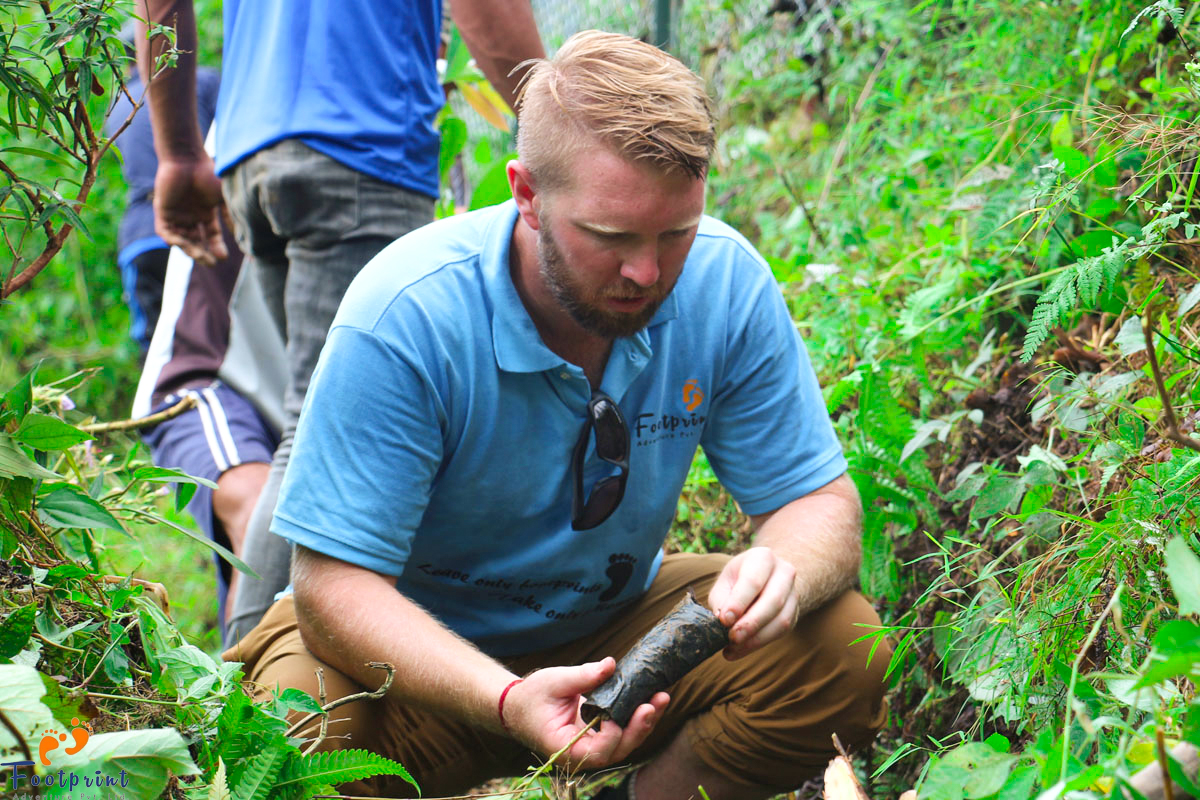
Selecting a dependable company that has the knowledge, a sincere commitment to conservation, and collaborates with local residents is crucial while volunteering for conservation. Connect with Footprint Adventure to get indulge in several conservation volunteer programs.
Observe Wildlife In An Ethical Manner
Be accountable when partaking in wildlife activities like a jungle safari or bird-watching. Keep a safe distance from animals, don't feed them, and appreciate their natural habitats. Animals can be frightened and have their natural behavior disrupted by sudden loud noises. Learn the precise laws and regulations created for wildlife watching before entering national parks or wildlife reserves. You increase the possibility of seeing genuine animal behavior in its native habitat by remaining calm and respectful. Animals and their habitats can be harmed by littering. Waste should be disposed of properly in specified containers or carried around until it may be done so. Choose wildlife sightseeing outings that have a priority on animal welfare and preservation.

You can help conserve Nepal's diverse biodiversity and ensure that future generations can also relish the beauty of its natural heritage by committing to ethical wildlife observation.
Conserve Energy and Water
Nepal is encountering an increase in water scarcity, mainly in rural areas. Saving water and energy is essential for Eco-friendly travel in Nepal since it minimizes the negative consequences of tourism on the environment and encourages the sustainability of resources. Consider your water consumption while traveling responsibly by turning off the water taps when not in use. Give preference to accommodations that use environmentally friendly practices, such as energy-saving lighting, renewable energy sources, and fixtures that lessen water consumption. Additionally, whenever possible, go for environmentally friendly modes of transportation like walking, cycling, or public transportation. If you can, consider participating in initiatives to clean up, awareness campaigns, or projects supported by the community that encourages sustainable resource management as a volunteer. You may reduce your environmental impact and aid in the overall sustainability of Nepali tourism by practicing water and power conservation.
Leave No Trace
Make sure you depart the surroundings in the same ideal condition as you found them. The "Leave No Trace" motto is relevant globally, including in Nepal. Make sure you properly understand the part of the country you will be visiting by doing some research and planning your activities before you go out on your journey. The "Leave No Trace" principle, which encourages sustainable and responsible tourism practices that reduce the human influence on the environment, is crucial for eco-friendly travel in Nepal. By following approved routes and avoiding causing harm to vegetation or other natural elements, travelers may show respect for natural vicinities. Keep a safe distance from wildlife and use binoculars or a zoom lens to observe it from a distance. Use regular garbage dumping facilities or bring a little pouch to keep your trash until you can adequately dispose of it. Similarly, if you need to enjoy a campfire, use specified locations and follow any rules or guidelines about flames. Further, make space so that other visitors can appreciate the magnificence of the environment.
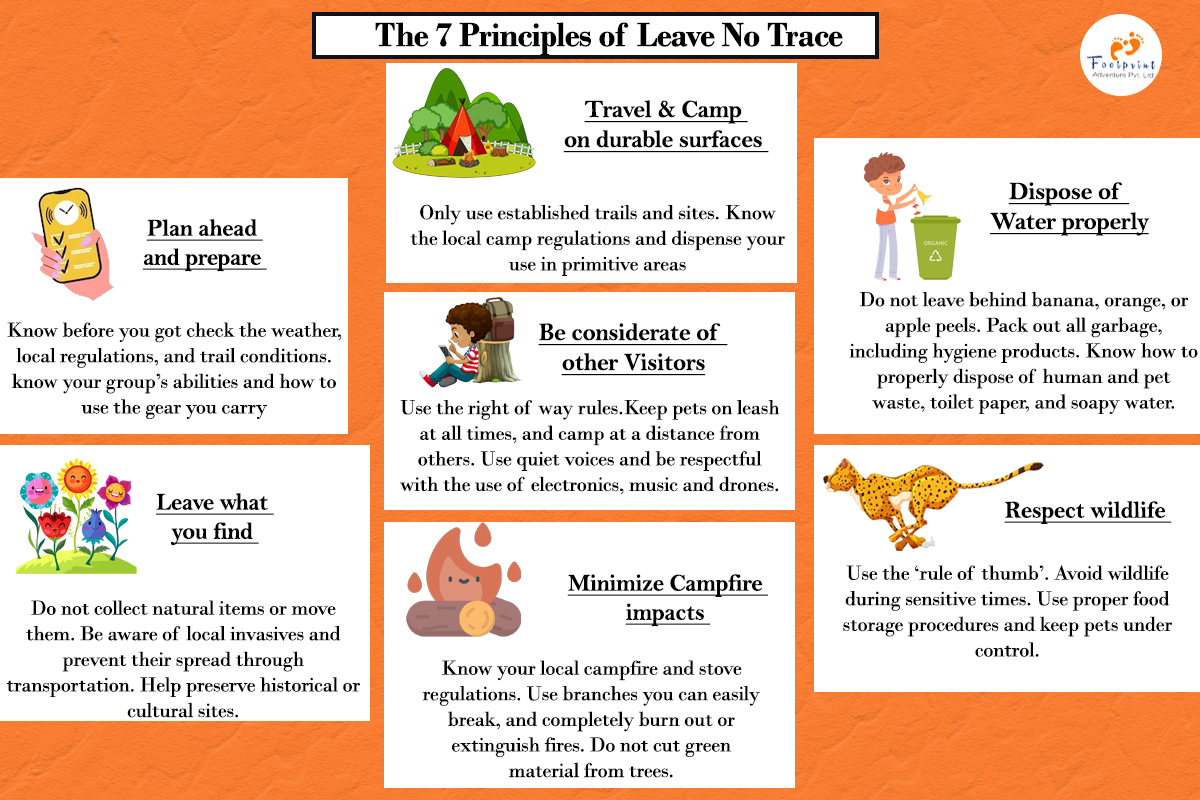
We can maintain and conserve Nepal's different assets for years to come by being conscious of our behavior and making deliberate judgments regarding nature.
Acquire Knowledge and Share It
A key part of responsible tourism in Nepal is educating yourself on the value of safeguarding biodiversity and the advantages of Sustainable tourism. Spend plenty of time before your journey learning about Nepal's varied ecosystems, heritage of culture, and wildlife. Learn about sustainable tourism practices and how your behavior might impact the environment and local people. Respect the cultural norms of the destination as a Conscious traveler. Cultural interaction promotes respect and understanding among people. Encourage others to adopt eco-friendly approaches by minimizing plastic footprint, saving energy and water, and boosting local endeavors and enterprises.
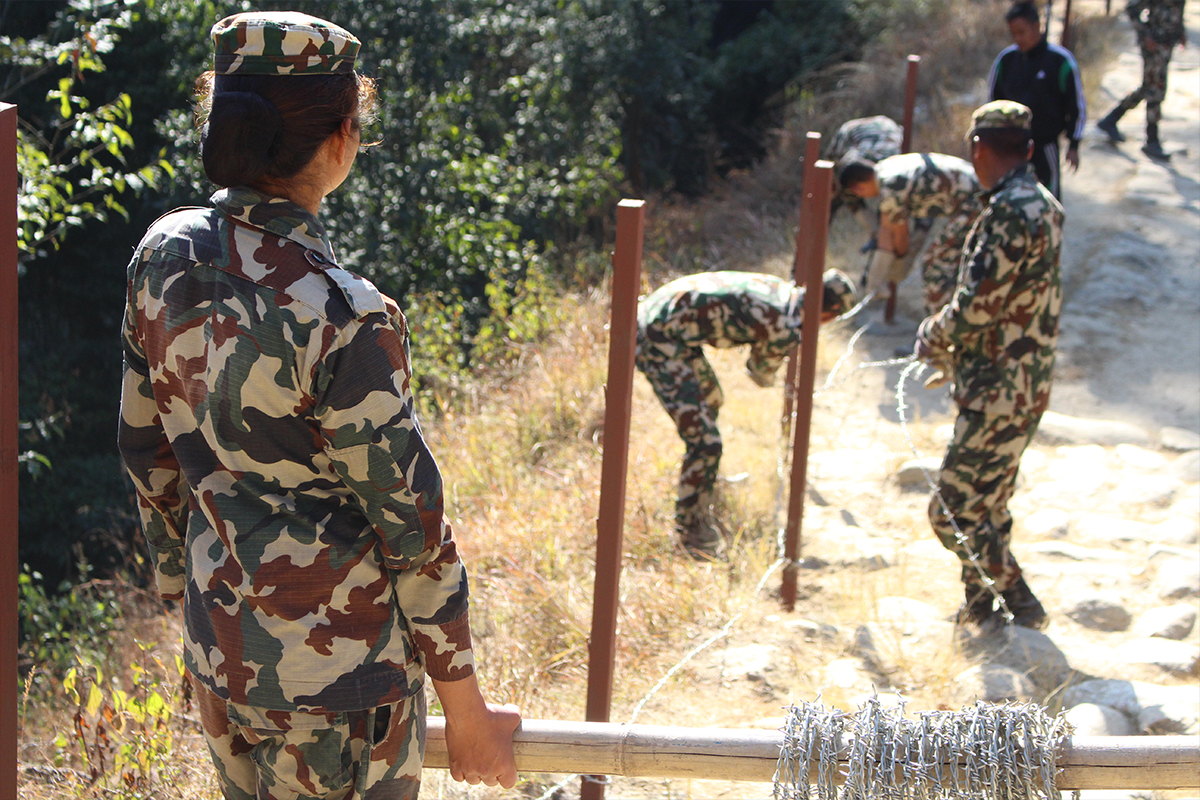
Your choices and understanding can inspire positive change, and by educating yourself and others, you support our joint work to advance Responsible tourism in Nepal.
Conclusion
In the end, the intent is to assure that the world will consistently be there for us to see, not to see it before it is too late. Together, we can set a positive and mutually worthwhile relationship between Nepal's natural and cultural assets and the tourism industry. As a conscious traveler, you can immensely contribute to the conservation of Nepal's irreplaceable natural resources and the advancement of more sustainable travel practices by engaging in these little but effective actions. You can actively promote eco-friendly travel in Nepal by adopting these important and practical suggestions into your travel activities. By leaving a small environmental mark while traveling, you can boost sustainable tourism and help Nepal's natural magnificence inspire and delight the generations to come.
We expect that this inspires you to ponder how you might travel more ethically on your upcoming trip to Nepal. Feel free to contact us if you have any more important information that we neglected to include so that you can participate in the many sustainable tourism activities we have prepared.
Some Do’s and Don't’s as a Conscious Traveler
It is crucial to approach your trips with a powerful sense of responsibility and reverence for the areas you visit if you want to be a conscious traveler. You make sure that your voyages have an advantageous impact on the environment, local communities, and cultural roots by sticking to a list of dos and don'ts.
Do’s
- Carry your eco-friendly products with you to avoid contributing to the plastic issue.
- In Nepal, handshakes are rare. By touching your palms together and uttering "Namaste," you can greet locals.
- Please refrain from dragging any stones from the stone walls that feature Tibetan Buddhist descriptions. Respect cultural standards and values.
- Be aware of how much water and energy you use. Do conserve resources.
- Eat, shop, and accommodate locally. Contribute to the local economy.
Don't’s
- It can be heartbreaking to encounter kids on the street. Do not give street children cash, candy, or other offers. Instead, think about donating to a charity, a social enterprise, or a school.
- Watch how much water you utilize, particularly in areas where there are water shortage problems. Don't waste water.
- Although Nepal is an amazing place for exploring wildlife, always remember to travel responsibly and ethically. Avoid endangering wildlife or the habitat.
- Instead of using cutlery, many Nepali foods are eaten using the hands. Never eat with your left hand, shake hands, or hand over cash.
- Don't take photographs of the local people or their surroundings without their approval.
Frequently Asked Questions
What are the principles of Eco-tourism?
Generally, there are three basic principles of eco-tourism which include: Awareness and education, community engagement, and conservation of biodiversity. These regulations encourage travelers to admire and respect the environment, avoiding actions that could harm or disrupt delicate ecosystems.
Is traveling eco-friendly difficult?
Eco-friendly travel does not have to be tough. We can take pleasure in our journeys while limiting our ecological imprint and aiding in the shift to a more sustainable future by being conscious of our actions and making deliberate decisions. Utilizing sustainable habits while traveling can have a big impact, even though it can take a little additional planning and effort.
What is eco-friendly travel?
Travel that emphasizes the wellness of the environment, local people, and cultural inheritance is referred to as eco-friendly travel, also known as sustainable travel or responsible travel. It entails making plotted decisions to reduce the consequence of tourism on the environment, cut carbon emissions, boost the local economies, and appreciate regional cultures and traditions.
What do you think is the main reason why bus travel is eco-friendly?
Bus travel is viewed as environmentally favorable for several reasons, one of which is that it lowers individual carbon emissions. Buses can adjust a high number of passengers, which lessens the number of automobiles on the road. Compared to individual cars, this decreases traffic congestion and general fuel usage as well as emissions per person.
How to travel more eco-friendly?
There are several initiatives you may take to travel more sustainably. To reduce carbon emissions, begin by using public transportation or choosing shared rides. Bring a reusable water bottle, shopping bag, and utensils to lessen the amount of plastic waste. Be respectful to the local people, the wildlife, and the environment while traveling. Promote local companies and initiatives that have a priority on sustainability. Furthermore, get knowledgeable about environmentally friendly travel techniques and raise awareness to boost others to make responsible decisions.










